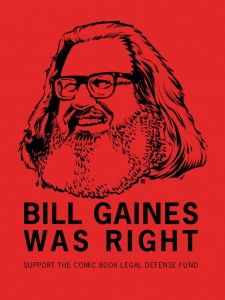 Our readers undoubtedly know about EC Comics publisher Bill Gaines’ valiant defense of comics at a 1954 Senate hearing investigating whether the funny books were leading children into a life of crime. Now a recent feature at Mental Floss is highlighting how Gaines and co. continued to antagonize federal authorities–namely the FBI–during the glory days of Mad magazine in the 1950s and ‘60s.
Our readers undoubtedly know about EC Comics publisher Bill Gaines’ valiant defense of comics at a 1954 Senate hearing investigating whether the funny books were leading children into a life of crime. Now a recent feature at Mental Floss is highlighting how Gaines and co. continued to antagonize federal authorities–namely the FBI–during the glory days of Mad magazine in the 1950s and ‘60s.
Gaines began publishing Mad in 1952 as a spoof of genre comics, but after the Comics Code Authority was instituted in 1954 he simply changed the publication to a magazine format in order to circumvent the new restrictions. That’s why, in 1957, Mad was able to publish a column jokingly encouraging readers to write J. Edgar Hoover at the FBI to “request a membership card certifying themselves as a ‘full-fledged draft dodger.’ ” At least three readers actually took on the tongue-in-cheek challenge, and the Bureau was unamused to say the least. In an internal memo, an agent identified only as M.A. Jones issued a dry critique of the magazine:
This book purports to satirize well-known comic figures, advertising, television and radio shows, well-known individuals, etc. However, it is extremely violent in its nature. It is also of interest to note that in its satirical treatment of famous historical incidents in American history it is rather unfunny.
The memo even referred to Gaines’ Senate testimony, noting that he “claimed to be the one who introduced horror comics” and “defended such publications while testifying.” But according to Jones, Mad’s most grievous sin with the draft dodger gag was making a mockery of the FBI’s patron saint:
Since the misuse of the Director’s name will probably result in the receipt of many such letters as the attached three communications, and since the use of the Director’s name is certainly in bad taste, it is felt we should have our New York Office contact the “Mad” offices to advise them of our displeasure and to insist that there be no repetition of such misuse of the Director’s name. It is felt that the letters which are attached should not be acknowledged.
When the New York agents made their visit to Mad, both Gaines and editor Al Feldstein were conveniently out of the office. The agents spoke instead to art director John Putnam, who assured them that “ridicule, harassment or harm was the last thing in the world intended for the Bureau or Director Hoover.” Putnam promised that Mad would not misuse Hoover’s name again, and Gaines followed up with a letter of apology on January 2, 1958.
Of course, Mad was in fact back at it again before too long. The March 1960 issue featured a spoof ad combining Hoover’s name with that of a popular vacuum cleaner brand: “The Honorable J. Edgar Electrolux”. M.A. Jones, apparently on permanent assignment to the Mad beat, sent out another internal memo noting with indignation that:
Obviously, Gaines was insincere in this promise [not to mock Hoover] since his magazine has again placed the Director in a position of ridicule and it is felt we should once more contact Gaines or another official and firmly and severely admonish them concerning our displeasure at the tasteless misuse of the Director’s name.
In 1961 Mad again displeased the Bureau by encouraging readers to complete a “writing exercise” and anonymously send it to local newspapers. The exercise began innocently enough, but ended with a demand for “$25,000 in unmarked bills.” Once again a few naive readers actually carried out the task, and once again M.A. Jones wrote a memo. After an overview of the FBI’s previous contacts with the magazine, Jones finally concluded that repeated upbraidings were not having the desired effect:
An official of this magazine was contacted by a Bureau official in December, 1957, to protest a tasteless reference to the FBI and despite assurances given at that time, they have continued to publish slurring remarks about the Bureau. In view of this situation it was deemed useless to protest all such irresponsible remarks to a magazine of this poor judgment and capriciousness.
Although the FBI’s humorless and prissy reaction to Mad is certainly amusing in itself, it also provides an illuminating reminder of the value of freedom of the press–even and perhaps especially for satirical publications, which often tackle hot issues long before the mainstream media takes them on. The fact that Gaines and others on staff apparently had extensive FBI files is certainly a bit concerning, but even the Bureau ultimately had to admit that there was no way for it to stop “tasteless” publications from seeing the light of day.
Help support CBLDF’s important First Amendment work by visiting the Rewards Zone, making a donation, or becoming a member of CBLDF!
Contributing Editor Maren Williams is a reference librarian who enjoys free speech and rescue dogs.